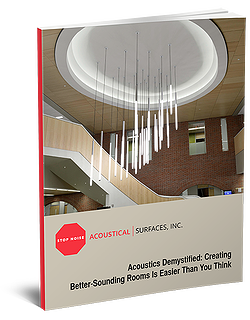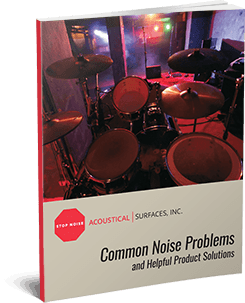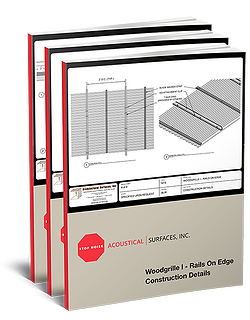Let’s talk about Construction Noise
Take a look around any major city, and you’ll see cranes on the horizon. Not the bird but the metal behemoths that signal growth. Each crane represents a new residential building or warehouse that will add homes or jobs to the region. It’s great for the economy, but nearby residents dream of the days when the cranes migrate to another neighborhood. That’s because all these new construction projects bring with them an abundance of construction noise.
Noise is a natural byproduct of large construction projects, but it doesn’t have to overwhelm the block. Measures can be taken to quiet the heavy machinery fashioning cold steel and stone into new structures. Here’s how to protect your home or business from an excess of unwanted noise.
Why is Construction Noise Such a Problem?
No one likes noise. In fact, it’s downright bad for our health. Even at low levels, chronic exposure to noise can result in increased stress and lowered focus. This can cause us to make mistakes at work, miss out on sleep at home, and result in health issues. It’s a serious productivity killer with health ramifications. As we turn the volume up, the problems increase with it.
When we are exposed to sounds over 70 decibels(dB), we begin to potentially damage our hearing. The louder those sounds, and the longer we are exposed, the greater the chances of hearing damage. Construction noise decibels exceed the OSHA recommended limits for entire 8 hour workdays at a time. Limiting the amount of noise you are exposed to is the best way to keep everyone happy and healthy.
What Causes Construction Noise?
The first step of building a good defense is understanding what you’re up against. You need an understanding of a handful of factors first. Factors like: what makes construction noise so loud? What are the major sources of that noise? What is the loudest part of construction?
A large part of the reason construction noise is so disruptive is the source of the sound. There are a few big sources of unwanted noise on any construction site, and each is particularly loud. Let’s look at the main offenders when it comes to causes of construction noise.
Equipment
Moving all the heavy materials around a job site requires quite a bit of power. Because of this, the typical noise levels of construction equipment are incredibly high. Nearly every one of them creates unsafe levels of noise. Some of them, like road grinders and chainsaws, produce around 110dB. That’s loud enough to have an immediate impact on your hearing. It is essential that workers near this type of machinery wear hearing protection. Even through home and office windows, noise levels can be high enough to contribute to significant hearing damage.
Materials
The materials we use on construction sites are all very hard and dense. This is obviously a necessity for creating structurally sound buildings, but these materials also contribute to noise issues. Cutting, drilling, moving and fastening hard materials creates a lot of sound. While we can’t always use different materials, we can soundproof our homes and offices to lower our exposure.
Environment
If your construction site is in the city, surrounded by big buildings, you’ve got environmental conditions contributing to the noise. The smooth, flat surfaces on the surrounding buildings reflect and amplify many of the sounds that impact them. Windows, metal, and concrete can all contribute to that amplification. Noise levels for construction equipment don’t need any further amplification to do damage. You’ve got a lot of noise to contend with.
Solutions for Reducing Construction Noise
You aren’t causing the construction noise, and it should only last a few months. Why on earth would you cover the costs to control noise from outside sources? Well, you probably deal with more pervasive noises than you think. Protecting the home or office from other neighborhood noises is just as important as protecting against construction projects. Here’s how to get the most bang for your buck.
Reinforce the Windows
Since exterior construction noises are your current cause for concern, let’s start with the weak spot. Windows let in the light that reminds us that we don’t live and work in dungeons. Unfortunately, they can also let a lot of exterior noise in as well. Sealing them up well can solve some of your issues. If you’ve got single paned windows, you may need another line of defense.
Installing new windows is a big help, but not always feasible in leased office spaces or apartments. A great alternative is to use window inserts. They mimic the effect of double glazed windows, and work as a sort of window insulation. They also do so at a fraction of the cost you’d pay for new windows. They are available in standard sizes and can be custom cut to fit your windows. They’re a great solution to both heat and sound passage.
Reinforce the Walls
Whether we’re talking about residential soundproofing or commercial soundproofing, one of the biggest points of emphasis is the exterior walls. Depending on the materials in them, they can allow loud sounds to creep in. If you feel like your walls aren’t up to par, there are a few things you can do about it.
First, you can double down on the insulation. Many older homes have little to no insulation in the exterior walls, depending on where you live. If your walls are hollow or stuffed with old newspapers, consider using insulation that’s rated for both sound and heat. Not only will it reduce noise, but it can also reduce your electric and gas bills.
Second, you can add some mass loaded vinyl to your existing walls. They will add some good mass and density right where your walls need it. You don’t even need to open the walls up to install it. Just roll it out on top of your drywall, and you’re set. If you want to take it a step further, add another layer of drywall on top. But make sure your framing is strong enough to support the added weight before beginning.
Reinforce the Doors
Doors are another place where noise creeps in. If you can hear the construction noise coming in through the door itself, you’ll need to address it. Sometimes it’s as simple as sealing all the gaps around the door. If air can get through, so can sound. But that won’t always work. You may need to add mass as well.
If your exterior doors don’t have enough mass, it’s hard to effectively block outside sounds. Most of the time, exterior doors are far stronger than interior doors, for good reason. They keep weather and unwanted visitors out. It’s important that they’re strong. But strong doesn’t always translate into dense.
If you’ve got an old door with big windows, you could have a weak spot. Old windows can let out a lot of sound and cold air in. Sealing them will go a long way. If you want to take it even further, replace your current door with something a little heavier and without windows.
Utilize a White Noise Machine
In the office, a white noise machine can hide much of the ambient noise present with something more pleasant. Choose from white noise, brown noise, pink noise, or whatever creates a more serene environment in your office. It’s a great way to use sound to combat sound.
They can be run from a central unit to individual speakers to cover the entire office. This means everyone gets the same zen ambiance, no matter where their desk is. It also allows you to precisely control sound levels so no one gets overzealous with their white noise. If you’re looking for an office-wide solution, this may be the ticket.
Soundproofing Contractors Near Me
Seeing that construction is going on outside the office may make you want a team of your own. You can hire soundproofing contractors to install soundproofing materials in your office, but most often don’t need to. Once you know the basics of soundproofing and acoustic treatments, you can do a lot yourself. Many products are easy to hang yourself. Others will fit into the t-grid you’ve already got supporting your drop ceiling. Make sure you know what you’re doing, though.
Talking to a soundproof expert will ensure you use the right materials and install them correctly. We’ve been doing it a long time, and we’ve seen it all. Even the loudest construction noise can be controlled with the right solutions. If you’re ready to create a quieter workplace, reach out to find out how it’s done.



